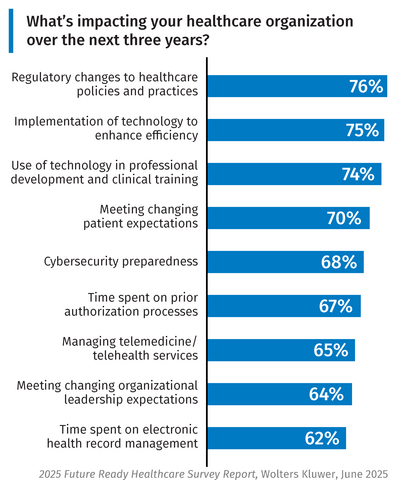Wolters Kluwer Future Ready Healthcare Survey Report Reveals Significant Opportunity for Healthcare GenAI—If Health Systems Can Overcome the Readiness Gap
Healthcare professionals see generative AI (GenAI) as key to solving sustainability problems, including the workforce crisis. But many organizations remain unprepared to implement it effectively.
This press release features multimedia. View the full release here: https://www.businesswire.com/news/home/20250603704329/en/

According to the
The survey identifies strong enthusiasm for using GenAI to address the current challenges of workforce shortages, burnout, high healthcare costs, and rising administrative burdens, as well as keen interest in leveraging GenAI to achieve the next level of innovation and efficiency across the enterprise.
However, the data also shows a clear disconnect between what organizations say they want to achieve with GenAI and how prepared they are to deliver on that promise. For example, while 80% of respondents cited “optimizing workflows” as a top organizational goal, only 63% feel prepared to use GenAI to do so.
“GenAI has the potential to be a powerful tool for supporting sustainability in healthcare organizations right now, as well as preparing them for a more efficient future,” said
Key Findings:
- Nurse staffing and workforce concerns are at the top of the priority list for health GenAI applications: 85% of respondents cited “recruiting/retaining nursing staff” as a top priority, while 76% identified “reducing clinician burnout” as a main concern.
- Leaders are focusing on the basics to keep the enterprise running: GenAI-driven technologies are likely to be part of the solution for longstanding challenges, such as addressing the burdens of prior authorizations (67%), electronic health record (EHR) management (62%), cybersecurity preparedness (68%), and supporting telehealth/virtual care programs (65%).
- But clinical staff expect more from the GenAI revolution: In qualitative responses, participants said they understand and acknowledge the need for workflow optimization but also want to see innovative capabilities such as ambient listening, clinical decision support leveraging GenAI, and assistance with communication and documentation utilizing GenAI.
- Formal GenAI policies and guidance are scarce: Only 18% of respondents were aware of formal organizational policies governing GenAI use, and only 1 in 5 reported being required to take structured training.
- As a result, concerns about appropriate implementation persist: More than half (57%) believe that overreliance on GenAI may erode clinical decision-making skills, while 55% are concerned that lack of transparency around GenAI’s potential role in making diagnoses could contribute to unclear reasoning behind patient-facing decisions.
“To successfully integrate GenAI, organizations must recognize its current limitations, as well as anticipate its realistic evolution and the regulatory landscape,” said Dr.
About the
The 2025 Future Ready Healthcare Survey Report is based on a nationally representative survey conducted by Ipsos, an independent marketing research firm, in early 2025. Respondents included physicians, nurses, pharmacists, allied health professionals, administrators, and medical librarians across the US. Download the 2025 Future Ready Healthcare Survey Reportto read more.
About
For more information, visit www.wolterskluwer.com, follow us on LinkedIn, Facebook, YouTube and Instagram.
View source version on businesswire.com: https://www.businesswire.com/news/home/20250603704329/en/
Media Contact
Director,
+1 (781) 392-2411
andre.rebelo@wolterskluwer.com
Source:
